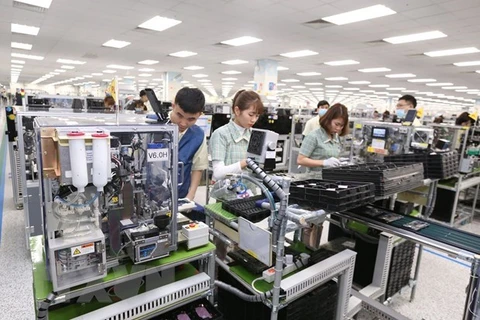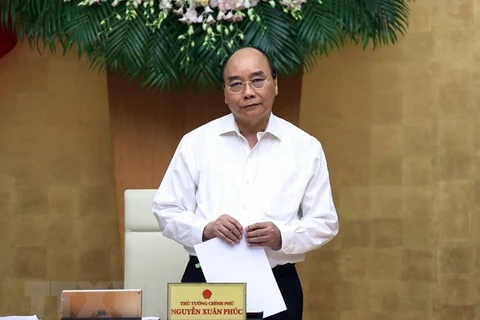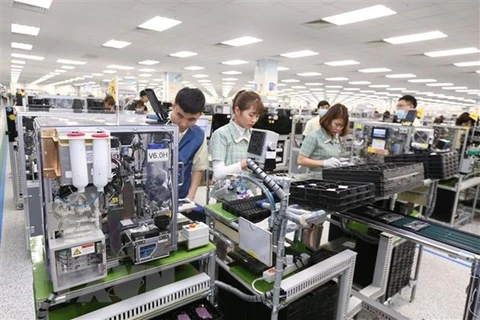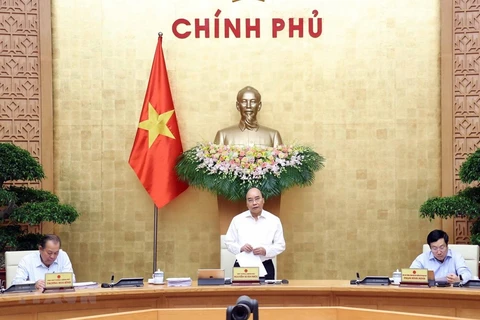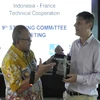Singapore (VNA) - Vietnam’s robust economic performance over the past three decades has been heavily dependent on exports and foreign direct investment (FDI), with foreign invested companies accounting for 67.8 percent of the country’s total export turnover in 2019, according to the Institute of Southeast Asian Studies (ISEAS) of Singapore.
An article by Le Hong Hiep published on September 2 on the development of Vietnam's economy says that Vietnam’s impressive foreign trade and FDI performance over the past 30 years has turned the country into one of the most open economies in the world. In 2017, for example, Vietnam’s trade-to-GDP ratio was 200.4 percent, which was the sixth highest in the world. In Asia, Vietnam was only behind Hong Kong (375.1 percent) and Singapore (322.4 percent).
Similarly, FDI is also playing an important role in Vietnam’s economic development. In 2019, the net annual FDI inflow of Vietnam was equivalent to 6.3 percent of its GDP, which was the fourth highest in Southeast Asia, after Singapore (28.3 percent), Cambodia (13.7 percent), and Laos (7.4 percent).
“Vietnam’s openness to trade and FDI originated from a combination of economic and strategic considerations. Vietnam considers international economic integration as a key measure to promote socio-economic development and to achieve the Communist Party of Vietnam’s (CPV) goal of national modernization and industrialization. In other words, Vietnam considers foreign trade and investment as key tools to transform and upgrade its economy,” said the article.
At the same time, Vietnam also has strategic interests in pursuing open trade regimes, especially FTAs with key economies, and attracting FDI.
Vietnamese strategists believe that by integrating Vietnam deeply into the global economy and strengthening economic ties with the major powers, Vietnam can align its economic interests with its partners.
The article said Vietnam generally benefits from foreign trade and FDI because they create jobs and upgrade skills for the workforce, contribute to tax revenue, and boost workers’ income. Nevertheless, Vietnam’s excessive reliance on exports and FDI has been seen as a potential problem for the country. While foreign invested companies accounted for only 20.3 percent of Vietnam’s GDP, they contributed a whopping 67.8 percent to the country’s total export turnover in 2019.
However, Vietnam’s over-reliance on exports and FDI has generated concerns among policy makers and experts, it said.
The Vietnamese government also appears to be well aware of the problem and certain remedial measures have been adopted. This is reflected in a remark by Prime Minister Nguyen Xuan Phuc at a meeting with local entrepreneurs in June 2019: “We have to build a self-reliant economy in the context of international integration. Hence, we must have a (strong) team of corporations of different types of ownership, including native private enterprises”.
Vietnam’s FDI policy has long been favouring foreign investors. But recently, in dealing with domestic investors, especially private enterprises, the government has stressed four key principles: equality, being protected, being incentivized, and being given opportunities.
Another measure is to encourage private enterprises to expand their businesses, especially into the manufacturing and high-tech sectors, to strengthen Vietnam’s domestic industrial base. The government’s support for Vingroup, the country’s largest private conglomerate, to expand into automobile, electronic and high-tech industries is a case in point. If successful, such “national champions” will not only boost Vietnam’s GDP growth, but also generate more exports for the country. After all, foreign investors may come and go, while local businesses will always stay, and their success and long-term commitments will be the key to Vietnam’s self-reliance and long-term economic prosperity.
Finally, Vietnamese businesses are also encouraged and assisted to work with foreign firms to participate in the global value chain. This is an important measure as it enables Vietnamese firms to grow up and play a bigger role in the economy in the long run. However, it is also a serious challenge as after more than 30 years, the expected spill-over effect from FDI is still limited. Samsung, for example, sources most of its components for its mobile phone factories from foreign suppliers. Among suppliers who accounted for 80 percent of Samsung Electronics’ transaction volume and agreed to be disclosed, 28 are based in Vietnam but all of them are foreign companies.
To address this issue, the Vietnamese Ministry of Industry and Trade is working closely with Samsung to increase the number of qualified local suppliers for Samsung. As of 2019, the number of tier-one Vietnamese suppliers for Samsung had increased to 42.
“If all the three above measures are implemented successfully, Vietnam’s economy will become more resilient and its export-led, FDI-driven growth model can be claimed a success,” the article concluded./.
An article by Le Hong Hiep published on September 2 on the development of Vietnam's economy says that Vietnam’s impressive foreign trade and FDI performance over the past 30 years has turned the country into one of the most open economies in the world. In 2017, for example, Vietnam’s trade-to-GDP ratio was 200.4 percent, which was the sixth highest in the world. In Asia, Vietnam was only behind Hong Kong (375.1 percent) and Singapore (322.4 percent).
Similarly, FDI is also playing an important role in Vietnam’s economic development. In 2019, the net annual FDI inflow of Vietnam was equivalent to 6.3 percent of its GDP, which was the fourth highest in Southeast Asia, after Singapore (28.3 percent), Cambodia (13.7 percent), and Laos (7.4 percent).
“Vietnam’s openness to trade and FDI originated from a combination of economic and strategic considerations. Vietnam considers international economic integration as a key measure to promote socio-economic development and to achieve the Communist Party of Vietnam’s (CPV) goal of national modernization and industrialization. In other words, Vietnam considers foreign trade and investment as key tools to transform and upgrade its economy,” said the article.
At the same time, Vietnam also has strategic interests in pursuing open trade regimes, especially FTAs with key economies, and attracting FDI.
Vietnamese strategists believe that by integrating Vietnam deeply into the global economy and strengthening economic ties with the major powers, Vietnam can align its economic interests with its partners.
The article said Vietnam generally benefits from foreign trade and FDI because they create jobs and upgrade skills for the workforce, contribute to tax revenue, and boost workers’ income. Nevertheless, Vietnam’s excessive reliance on exports and FDI has been seen as a potential problem for the country. While foreign invested companies accounted for only 20.3 percent of Vietnam’s GDP, they contributed a whopping 67.8 percent to the country’s total export turnover in 2019.
However, Vietnam’s over-reliance on exports and FDI has generated concerns among policy makers and experts, it said.
The Vietnamese government also appears to be well aware of the problem and certain remedial measures have been adopted. This is reflected in a remark by Prime Minister Nguyen Xuan Phuc at a meeting with local entrepreneurs in June 2019: “We have to build a self-reliant economy in the context of international integration. Hence, we must have a (strong) team of corporations of different types of ownership, including native private enterprises”.
Vietnam’s FDI policy has long been favouring foreign investors. But recently, in dealing with domestic investors, especially private enterprises, the government has stressed four key principles: equality, being protected, being incentivized, and being given opportunities.
Another measure is to encourage private enterprises to expand their businesses, especially into the manufacturing and high-tech sectors, to strengthen Vietnam’s domestic industrial base. The government’s support for Vingroup, the country’s largest private conglomerate, to expand into automobile, electronic and high-tech industries is a case in point. If successful, such “national champions” will not only boost Vietnam’s GDP growth, but also generate more exports for the country. After all, foreign investors may come and go, while local businesses will always stay, and their success and long-term commitments will be the key to Vietnam’s self-reliance and long-term economic prosperity.
Finally, Vietnamese businesses are also encouraged and assisted to work with foreign firms to participate in the global value chain. This is an important measure as it enables Vietnamese firms to grow up and play a bigger role in the economy in the long run. However, it is also a serious challenge as after more than 30 years, the expected spill-over effect from FDI is still limited. Samsung, for example, sources most of its components for its mobile phone factories from foreign suppliers. Among suppliers who accounted for 80 percent of Samsung Electronics’ transaction volume and agreed to be disclosed, 28 are based in Vietnam but all of them are foreign companies.
To address this issue, the Vietnamese Ministry of Industry and Trade is working closely with Samsung to increase the number of qualified local suppliers for Samsung. As of 2019, the number of tier-one Vietnamese suppliers for Samsung had increased to 42.
“If all the three above measures are implemented successfully, Vietnam’s economy will become more resilient and its export-led, FDI-driven growth model can be claimed a success,” the article concluded./.
VNA

